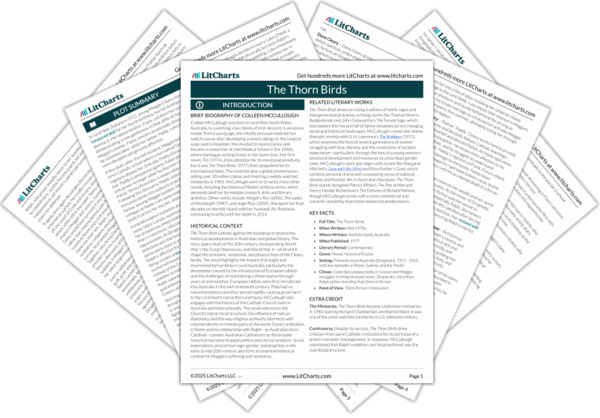Mary’s Will represents the cost of Ralph’s ambition, symbolizing the bargain he makes with power and the spiritual fracture that shapes the rest of his life. On the surface, it is a document of wealth and legal transfer, but beneath that, it functions as a moral test. Mary uses the will to trap Ralph between his yearning for ecclesiastical power and his love for Meggie, forcing him to define himself not by what he desires but by what he is willing to sacrifice. When Ralph chooses the Church, he gains influence and prestige but severs the part of himself that longed for human intimacy and a family of his own. The will becomes a symbol of that inner wound—a permanent reminder of how ambition, once chosen, cannot be abandoned without great loss. Mary’s cruelty lies in knowing exactly what Ralph will choose and ensuring that his ascent in the Church will always carry the weight of betrayal. Long after her death, the will echoes through Ralph’s life as a symbol of the moment he abandoned love for greatness and never stopped paying for it.
Mary’s Will Quotes in The Thorn Birds
After you’ve read the will, you’ll understand what I mean. While I burn in Hell beyond the borders of this life I know now, you’ll still be in that life, but burning in a hell with fiercer flames than any God could possibly manufacture. Oh, my Ralph, I’ve gauged you to a nicety! If I never knew how to do anything else, I’ve always known how to make the ones I love suffer. And you’re far better game than my dear departed Michael ever was.
Father Ralph moved restlessly. He had not stopped to shed his Requiem vestments, nor had he taken a chair; like a dark and beautiful sorcerer he stood half in the shadows at the back of the room, isolated, his hands hidden beneath the black chasuble, his face still, and at the back of the distant blue eyes a horrified, stunned resentment. There was not even going to be the longed-for chastisement of rage or contempt; Paddy was going to hand it all to him on a golden plate of goodwill, and thank him for relieving the Clearys of a burden.












